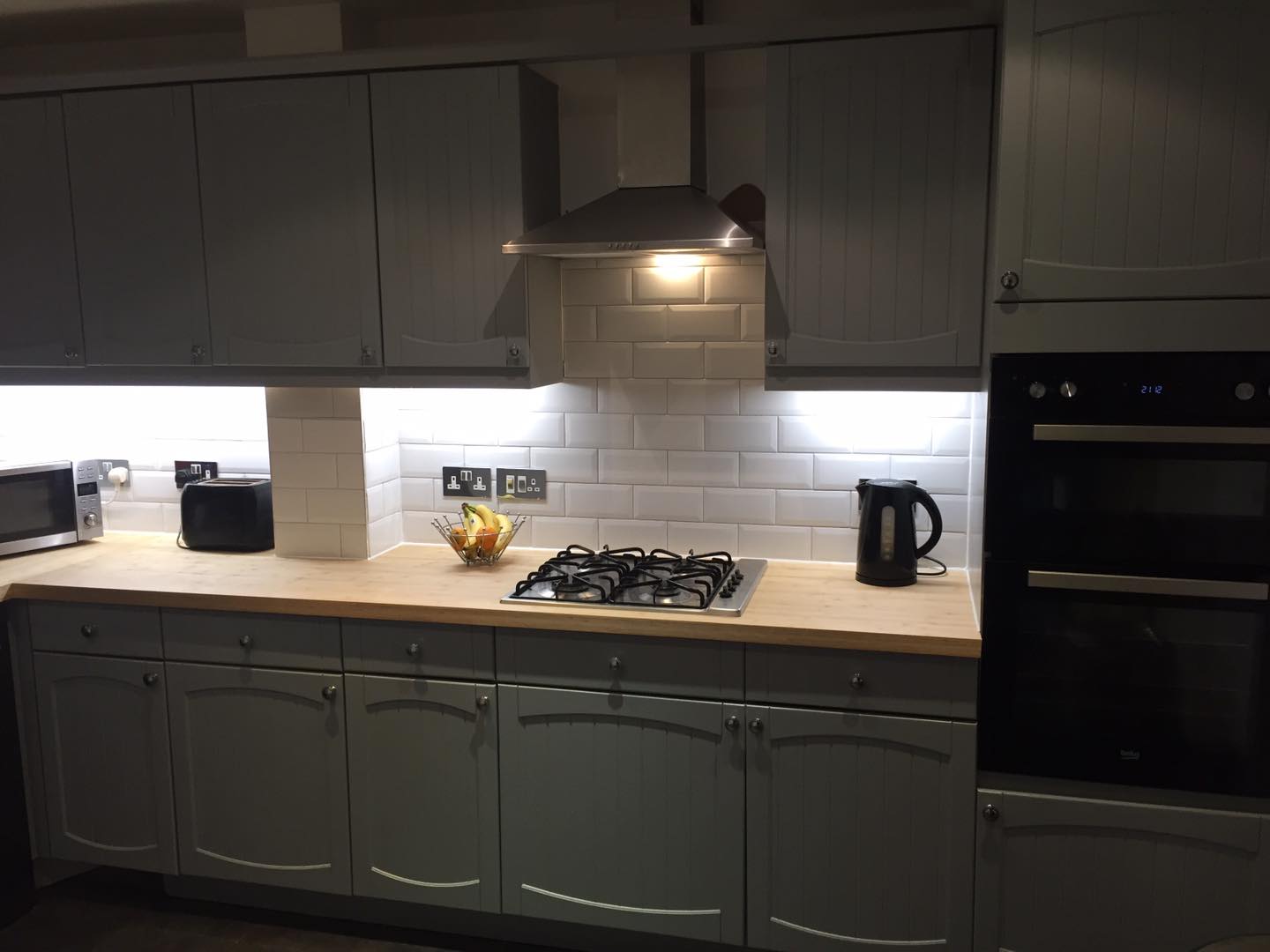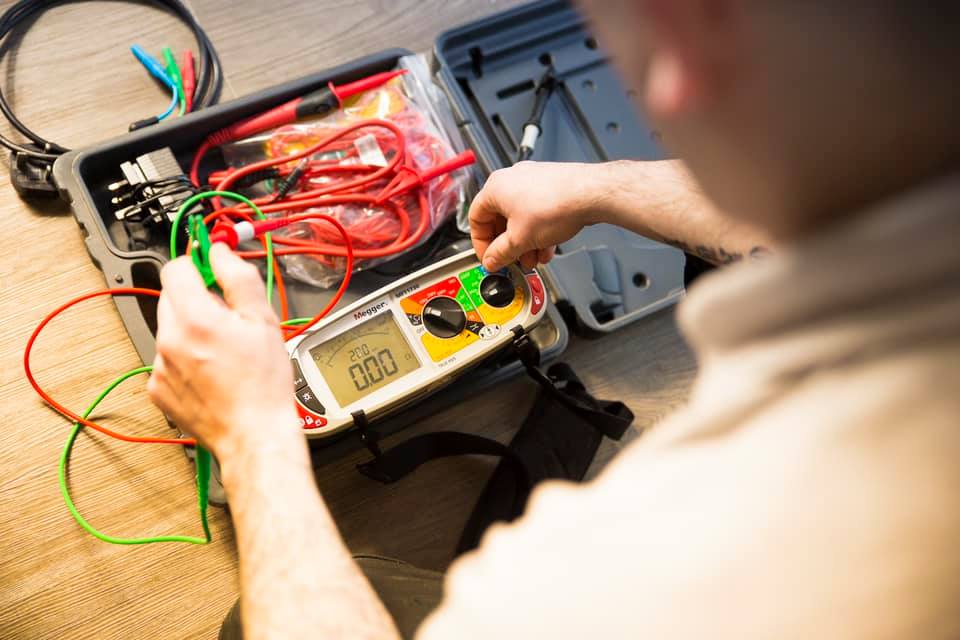Electrical Safety Certificate
Alpha Electricians are certified and can supply the following for all Homeowners Landlords
It is recommended that you should have an electrical inspection every three to five years, depending on how often your previous inspections were. This examination investigates the state of all wiring throughout and thoroughly checks if they are up-to-date with current standards. Afterward we will provide a certificate outlining any issues found in our findings.
Landlord electrical safety certificates are an important aspect for ensuring safety of your current and new tenants, and it proves that you have taken the correct measures and responsibilities in protecting their safety.
Electrical Safety Certificate
Do I need an electrical installation certificate?
Certain types of certification will be required following the completion of some specific types of electrical installation work. An electrical installation certificate will be provided for electrical work such as the installation of a new fuse board, electric circuit, or consumer unit. We are your NICEIC Electricians. Contact us today.
What is an electrical installation certificate?
An electrical safety certificate has become increasingly important since the introduction of the Wiring Regulations in 1987. It is now a legal requirement to have all work ‘competently’ carried out by a person who is registered with one of the government approved scheme providers (such as NICEIC, ELECSA etc.) and for that company to take full responsibility for their work.
Many people think they only require an EIC when doing ‘substantial’ works which includes any kind of rewiring or complete change of use i.e. if you are changing your kitchen over from electric to gas – but it actually means any work requires an EIC (minor works like adding a plug socket do not require an EIC). The Wiring Regulations cover all electrical work in your house including:
- Rewiring residential or commercial properties
- Changing a consumer unit (fuse board) from fuses to circuit breakers or vice versa.
- Installing additional sockets or switches, downlights and spotlights etc.
- Fitting energy saving lamps such as low energy fluorescent lighting and LED lighting
- Work on electric showers and other fixed equipment which is connected to the supply i.e. built-in appliances that have their own dedicated cable from the consumer unit rather than being hard wired into the structure of the building e.g a dishwasher, washing machine, boiler etc… But if you are changing a shower over from an existing one you should check with the local authority electrical inspectorate.
Other fairly simple wiring jobs that don’t require any special knowledge. If the work done is more than relatively minor, for example, installing new circuit breakers or extra ring circuits etc then it would be advisable to get an electrician to do the job unless you are competent at carrying out this type of work yourself.
In addition to checking that your consumer unit (fuse board) complies with all the current regulations and that its main protective devices are in full working order, a domestic electrician will also test for earth continuity and insulation resistance between live conductors and earthed metalwork, including water pipes. In some cases they may find it necessary to replace old and outdated fittings with new ones that meet the current regulations.
An electrician will also test your electrical appliances, such as cookers, washing machines and immersion heaters for correct earthing and ensure they are safe to use.
All work is re-checked when complete by another electrician working to British Standard 7671: 2008 – Requirements for Electrical Installations (latest edition). This ensures compliance with the latest legislation.
Please note that you do not need a certificate if you’re simply replacing an appliance or fitting a ceiling light etc. It’s only in certain cases like moving a socket from one place to another, changing fuse rating etc where it would be advisable to get an Electrician to carry out this work for you.
Who signs an electrical installation certificate?
Electrical Certificates have to be signed off by a fully qualified and registered electrical engineer, otherwise they are invalid. Please do not accept one that is not signed.
Is an electrical installation certificate the same as an EICR?
In short: An electrical installation certificate verifies that work has been completed safely in accordance with building regulations, whereas an EICR verifies that the entire installed system meets safety standards.
Can I self certify electrical work?
Where any new electrical installation work is notifiable it should always be checked to make sure that it is safe for consumer usage. These types of electrical checks can be completed by:
- The qualified electrician that carried out the actual work, providing this electrician is a registered electrician with a competent person self-certification scheme.
- A building control body – either by your local authority or the building control department of a private approved building inspector.
- An electrician registered with a third-party certification scheme (This applies to England only)
As for self-certification, it is usually only possible with small jobs where there is no alteration of layout or an existing circuit position. This is because alterations may need planning permission before works can commence and in most cases (required by Building Regulations) such work must be carried out by an ‘Electrical Contractor’ who has been authorised either by one of two Government Agencies [ELECSA or NICEIC]. Either way, the building owner would be required to provide evidence that the work has been carried out to comply with Building Regulations, which may be difficult if the job is not properly documented.
Can I sell my house without an electrical certificate?
Missing or misfiled paperwork can cause delays when selling a house. Missing Electrical Installation Certificates (EIC) is one of the major setbacks for those looking to buy and close on their homes quickly, which is why it’s important you get this certificate in order before putting up your property for sale!

How to sell your home with a missing EIC
If you cannot find your original copy of the EIC, then the best thing to do is check whether it’s possible to download a copy online. If indeed an EIC was issued at the time of any completed work beforehand, you might be lucky and able to come up with a digital copy to download on the NICEIC website. If you fail to find a digital EIC copy, and you have reason to believe there was never one issued, all is not lost! There are a few options that you can take to satisfy your buyer’s request for an EIC certificate.
Try contacting the electrician who originally done the work and request a EIC certificate
Get a Part P-certified electrician to carry out an EICR report (Electrical Installation Condition Report)
Have the electrical work redone -. If you are unable to reach out to the original electrician that completed the work, you can get another electrician to complete the work again, which will certify this new installation.
Ask your conveyancing solicitor to recommend an indemnity policy that is suitable to protect the buyer.
How long is an electrical installation certificate valid for?
An Electrical Safety Certificate is a legal document that must be renewed every five years. The inspector will decide how long you need your certificate for, but as an electrician in the field I usually recommend getting one only when there’s been significant work done at home or if it needs updating because of new regulations on wiring safety since last renewal date (which might have occurred more than 5 years ago).
Minor Electrical Works Installation Certificate
This is similar to an EIC but is used when the electrical installation is minor such as additional sockets or light fittings not in a special location.

How much does an electrical compliance certificate cost?
Generally an electrical certificate would be priced all depending on a few factors such as the size of the home or premises, complexity of the circuits that are required to be inspected. Smaller sized properties like flats are generally around £150 plus for an EICR certificate and go up to about £300 plus for say a 3 bedroom dwelling, and can work out more for larger detached style houses. A firm and transparent price will be quoted before any work commences.
Electrical Installation Condition Report (popular with landlords)
These reports replaced the previous “periodical electrical report” but they are essentially the same thing.
The law states that a new landlord must get one of these completed before a new tenant moves in. Homeowners purchasing a new home should ideally have one completed too, especially if the property is old and the wiring hasn’t been updated.
You won’t get a certificate as such but you will receive a condition report.
Part P Notifications
Building Regulations Part P came into force in January 2005 to make sure that all electrical work that is carried out in a house or dwelling, basically a home or garden environment, is always safely carried out by a qualified and trained electrician. Also it ensures that the relevant building control is notified beforehand about this proposed work.
This government notification is important especially when moving house because the compliance certificate will be requested by your buyers’ solicitors to show that any previous electrical work that has been carried out at your house on behalf of your buyer or you as the seller is safe. Failure in compliance of this certificate could have an adverse effect in the future sale of the property, and the onus will fall on the homeowner to make sure this is in order.
EICR – Landlord Electrical Certificate
What is the landlord’s electrical safety certificate?
The new electrical testing certification requirements for landlords means that you must have your property tested every five years to be compliant. You will need to acquire this certificate in the form of a written report, completed by a qualified electrician or electrical engineer – this is called an Electrical Installation Condition Report or (EICR)
This new safety report does not need to be carried out every time a tenant decides to move out. But the landlord must supply and issue the new tenants that are moving in with an up to date copy of the current EICR at the start of their tenancy agreement.
